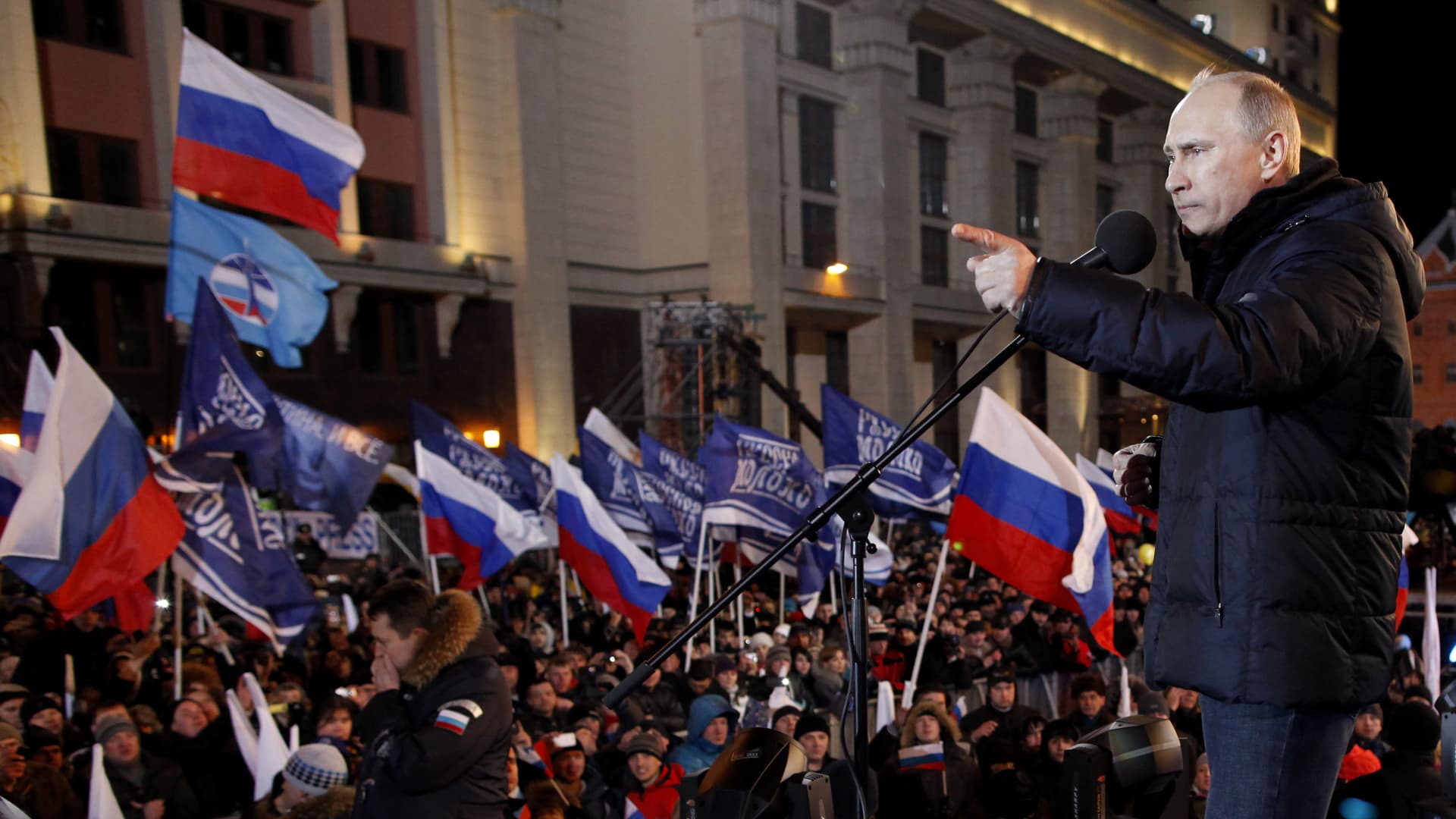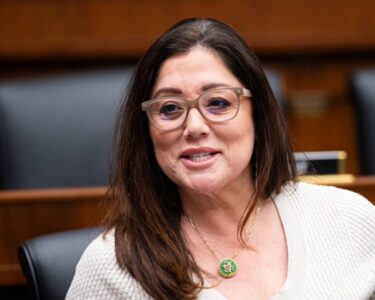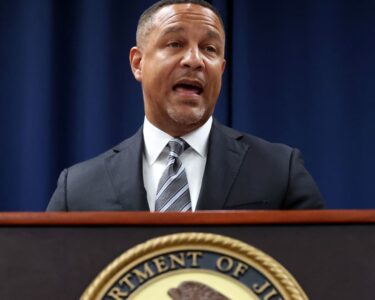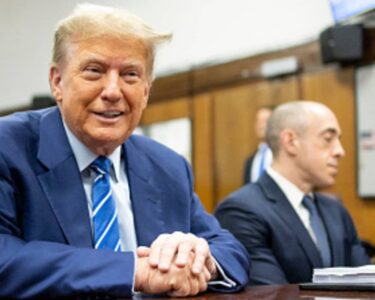This was CNBC’s live blog tracking developments on the war in Ukraine.
Russian President Vladimir Putin is expected to avoid making the Ukraine war the main theme of his widely expected presidential campaign ahead of elections in March 2024.
Neither Putin nor the Kremlin has confirmed that the president will run in the election, although it’s widely expected that, after 23 years in power as either prime minister or president, he will run for yet another term in office, taking his tenure up to at least 2030.
“Russian President Vladimir Putin will reportedly avoid centering his 2024 presidential campaign on the war in Ukraine and will rather focus on Russia’s alleged stability and criticisms of the West,” said analysts at the Washington-based Institute for the Study of War.
In other news, Ukrainian President Volodymyr Zelenskyy thanked Japan and other Group of Seven nations for their “unwavering support for Ukraine even amid other global developments” in a post on X, formerly known as Twitter.
G-7 leaders reportedly discussed further financial support for Ukraine and work toward Zelenskyy’s 10-point peace plan.
Ukrainian Infrastructure Minister Oleksandr Kubrakov and his Polish counterpart have discussed Polish trucker protests at the Ukrainian border, his ministry in Kyiv said on Thursday, adding that it would not compromise on licenses for Ukrainian drivers.
Polish truckers blocked roads to three crossings with Ukraine on Monday, authorities said, to protest what they see as government inaction over a loss of business to foreign competitors since Russia’s 2022 invasion of Ukraine. One of their main demands is for Ukrainian truckers to receive a limited number of licenses.
More than 20,000 vehicles were blocked on both sides, according to the Ukrainian ministry.
“Ukraine respects the right to protest and is ready for a constructive dialogue to resolve the situation … At the same time, we note that the border-blocking by Polish protesters violates logistics routes, that already affects both the economy of Ukraine and the European Union,” the ministry said in a statement.
Ukrainian authorities said on Wednesday that protests had caused disruptions at three border crossing points, but that the other five were running normally.
The protests occurred amid an economic slowdown in Europe and after the European Union’s 2022 relaxation of regulations for Ukrainian transport companies to ease the transport of goods into and out of the Eastern European country.
Ukraine is a major global food producer, but its main Black Sea export routes have been blocked due to Russia’s invasion, and traders are trying to send as many goods as possible via rail and the road borders with Poland, Slovakia and Hungary.
-Reuters
Russia signaled this week that it will not take Western efforts to build ties with Central Asia lying down, with Moscow conducting its own diplomatic push in the region traditionally seen as its own “backyard.”
Keen to maintain Russia’s dwindling sphere of influence in the region, Russian President Vladimir Putin is in Kazakhstan Thursday, making his presence felt a week after French president Emmanuel Macron visited the oil- and mineral-rich country, and its neighbor Uzbekistan.
Russia wants to maintain its foothold in Central Asia — a region comprised of Kyrgyzstan, Kazakhstan, Tajikistan, Turkmenistan and Uzbekistan — amid growing economic competition from China, and rising geopolitical interest from the West, much to Russia’s growing disdain and disapproval.
Read more here: As the West courts Russia’s neighbors, Putin shows he won’t give up its backyard without a fight
Hungary’s stance is that the EU should not start membership talks with Ukraine but should offer some form of “privileged partnership” for the country, Prime Minister Viktor Orban’s chief of staff told a briefing on Thursday.
EU countries’ leaders are due to decide mid-December on whether to accept the Commission’s recommendation to invite Kyiv to begin membership talks as soon as it meets final conditions. Any such decision requires unanimity of the bloc’s 27 members, with Hungary seen as the main potential obstacle.
— Reuters
Following the reported loss of several Russian SA-21 long-range Surface to Air Missile systems (or SAMs) recently, Russia will likely need to reallocate similar systems to maintain coverage over Ukraine, the U.K’s Ministry of Defence said Thursday.
“Russia’s premier long-range SAMs, such as SA-21, are capable of engaging targets at ranges of up to 400km,” the ministry said on X, formerly known a Twitter.
“Positioned at strategically important locations, as well as along Russia’s borders, removing systems would almost certainly weaken Russia’s air defence posture on its peripheries,” the intelligence update noted.
“The reallocation of strategic air defence assets would further demonstrate how the Ukraine conflict continues to overextend Russia’s military and strains its ability to retain baseline defences across its vast area,” it added.
— Holly Ellyatt
U.S. Secretary of State Antony Blinken said on Thursday he shared South Korean concerns about growing military cooperation between North Korea and Russia, which he called a “two-way street” involving arms flows and technical support.
Blinken and South Korean Foreign Minister Park Jin also said they discussed a so-called extended deterrence strategy in countering threats from North Korea, meaning the use of U.S. military assets including its nuclear forces for protection from attacks, and improving cooperation with Japan.
“We have real concerns about any support for North Korea’s ballistic missile programs, for its nuclear technology, for its space launch capacity,” Blinken told a press conference in the South Korean capital.
“We’re working to … identify, to expose and as necessary to counter these efforts.”
North Korean weapons have reportedly appeared in use in Gaza, and the United States and allies have condemned what they say is the flow of arms and military equipment from North Korea to Russia for use in Ukraine.
North Korea and Russia have denied any arms deals though their leaders pledged closer military cooperation when they met in September in Russia’s far east.
— Reuters
Russian President Vladimir Putin is expected to avoid making the Ukraine war the main theme of his widely expected presidential campaign ahead of elections in March 2024.
Neither Putin nor the Kremlin has confirmed that the president will run in the election, although it’s widely expected that, after 23 years in power as either prime minister or president, he will run for yet another term in office, taking his tenure up to at least 2030.
Analysts at the Washington-based Institute for the Study of War said it’s unlikely that Putin will focus on the war.
“Russian President Vladimir Putin will reportedly avoid centering his 2024 presidential campaign on the war in Ukraine and will rather focus on Russia’s alleged stability and criticisms of the West,” the ISW said.
“Russian opposition media outlet Meduza reported on November 8 that two sources close to the Russian Presidential Administration stated that the presidential campaign aims to paint Putin as a leader who made Russia an ‘island of calm.'”
The ISW also noted that Meduza’s sources claimed that Putin’s rise in ratings after speeches in which he criticized the West and Russian state propaganda will encourage this — by increasingly publishing stories about “difficulties” in Western countries and the U.S.’ alleged inability to support Ukraine and Israel simultaneously.
— Holly Ellyatt
Ukrainian President Volodymyr Zelenskyy thanked Japan and other G7 nations for their “unwavering support for Ukraine even amid other global developments” in a post on X, formerly known as Twitter.
Zelenskyy made special reference to Japanese Prime Minister Fumio Kishida, who he spoke to in order to “thank Japan for taking the lead in supporting Ukraine during its G7 presidency.”
The leaders reportedly discussed further financial support for Ukraine and work toward Zelenskyy’s 10-point peace plan.
— Hannah Ward-Glenton
Ukrainian President Volodymyr Zelenskyy praised the latest stage in the country’s attempt to join the European Union.
“This is a strong and historic step that paves the way to a stronger EU with Ukraine as its member. I thank the EU and personally [Ursula von der Leyen] for supporting Ukraine on our road to the EU,” Zelenskyy wrote on X, formerly known as Twitter.
The European Commission, the EU’s executive arm, published a report Wednesday that included a recommendation Kyiv be invited to begin membership talks as soon as its meets some final conditions, regardless of the continuation of the war with Russia.
“The Commission recommends that the Council opens accession negotiations with Ukraine and will monitor on the progress and compliance in all areas related to the opening of negotiations and report to the Council by March 2024,” the report said.
European leaders formally accepted Ukraine as a candidate to join the EU in June 2022.
— Hannah Ward-Glenton
Moscow and Beijing are not forming any military alliances “following the example of Cold War associations,” Russian President Vladimir Putin said Wednesday.
Putin met Zhang Youxia, the deputy chairman of China’s Central Military Council on Wednesday, as a wider delegation of Chinese defense officials visited Moscow.
“Russia and China are not building any military alliances following the example of the Cold War,” Putin said, alluding to coalitions like NATO — a Western military alliance formed after World War II that Russia heavily criticizes and repeatedly blames for stoking conflict.
“Our interaction with you is constructive and is a serious factor in stabilizing the international situation,” Putin said, as he addressed the Chinese delegation, according to Google-translated comments published by Russian state news agency Tass.
“Trade and economic ties are developing at a good pace. We are achieving the goals we have set for ourselves ahead of time, we are working on international platforms, in international organizations, primarily in the UN,” he listed.
According to the Russian president, Moscow and Beijing pay sufficient attention to regional platforms, which are “more and more acquiring a global character,” he said, referencing the Shanghai Cooperation Organization — a Eurasian political, economic, international security and defence alliance established by China and Russia in 2001 — and the so-called “BRICS” group of emerging markets, comprising Brazil, Russia, India, China and South Africa.
— Holly Ellyatt
The U.S. is bankrupting its European “vassals” but continues to buy uranium and critical materials from Russia, Foreign Minister Sergei Lavrov said Wednesday.
“Washington is essentially ruining its European vassals and allowing its military-industrial complex to earn money,” the minister said at an embassy roundtable, according to comments published by Tass new agency.
“It imposed and continues to impose expensive American liquefied natural gas on the European Union, and with its selfish laws forces European companies to transfer enterprises overseas to where base costs are lower, and while forcing the EU to abandon everything Russian, Washington continues to buy uranium and other critical materials from Russia,” Lavrov said.
Washington has reluctantly admitted that it continues to source a large amount of uranium, the most-used fuel by nuclear power plants for nuclear fission, from Russia.
The U.S. Energy Information Administration said that in 2022, 12% of its uranium imports were from Russia. Canada, Kazakhstan and Uzbekistan also provided a share of its uranium imports. The U.S. has looked to reduce or ban uranium imports.
— Holly Ellyatt
“A special operation” killed a Moscow-backed lawmaker in occupied Luhansk, Ukraine’s defense ministry wrote on Telegram.
“On November 8, 2023, at 08:40 a.m., as a result of a car explosion, the so-called deputy of the so-called “Supreme Council of the People’s Republic of Lugansk” from the Russian Party of the Liberal Democratic Party – Filipponenko Mikhail Yuryevich was eliminated,” the Telegram post said.
“He was involved in the organisation of torture camps in the occupied territories of Luhansk region, where prisoners of war and civilian hostages were subjected to inhumane torture. Filiponenko himself personally brutally tortured people,” the defense ministry added.
The lawmaker reportedly “died on the spot” as a result of the morning explosion.
CNBC was unable to independently verify the report.
— Hannah Ward-Glenton
Putin insists Russia and China are not building Cold War-like alliances as defense officials meet






